Jan 19, 2015 | News & Events
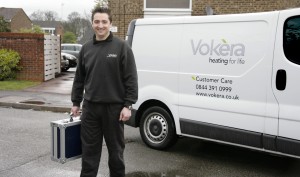 Vokèra, a leading heating manufacturer, has been highly commended by Domestic and General (D&G) customers for the second year running. D&G, the UK’s leading warranty specialist, generates a quarterly report based on a survey questionnaire sent to its customers following each callout regarding customer service and satisfaction. For the fifth quarter running Vokèra has received outstanding results. The latest report has put Vokèra in second place in comparison not only with rival boiler brands but crucially leading white goods manufacturers, with an overall satisfaction rating of 97.4%.
Vokèra, a leading heating manufacturer, has been highly commended by Domestic and General (D&G) customers for the second year running. D&G, the UK’s leading warranty specialist, generates a quarterly report based on a survey questionnaire sent to its customers following each callout regarding customer service and satisfaction. For the fifth quarter running Vokèra has received outstanding results. The latest report has put Vokèra in second place in comparison not only with rival boiler brands but crucially leading white goods manufacturers, with an overall satisfaction rating of 97.4%.
In 2014 as part of its on-going commitment to customers, Vokèra changed its customer care service to be open seven days a week. The centre based at the Bradford office is now open Monday through to Sunday, providing an ‘everyday’ service, with a dedicated team available to answer post-sales enquiries. This commitment to customer service is reflected in the survey results as ease of contacting Vokèra’s customer care team has risen by 4.5%, from 96.2% to 98.1% over the last year.
Another area Vokèra scored highly was for the time it took the engineer to arrive, whether they arrived on time and if not, whether they contacted the homeowner to say they were running late. Vokèra has consecutively scored highly and ended the year with a figure of 98.3%.
As well as its service, Vokèra’s engineers have also scored highly with 100% of customers satisfied with their appearance, 91.2% were delighted with their politeness, 100% were satisfied with the efficiency and overall 99.7% were satisfied with the Vokèra engineer.
The work completed by the Vokèra engineer was also commended, with only 1.9% of respondents saying that the boiler had further problems after being repaired. This reflects not only on the quality of Vokèra’s installers but also the quality of its products.
Vokèra is one of the leading UK boiler brands, renowned for its comprehensive range of energy efficient appliances, including the Unica i, Vision and Mynute i, supported by a reputation for excellence in customer service, support and training. The company’s product portfolio also includes a full range of ancillaries and control devices to optimise ease of installation and efficiency still further. Vokèra also supplies the market with a commercial boiler range, unvented cylinders, gas fired water heaters, solar thermal collectors and air source heat pumps. Established over 30 years ago, Vokèra has bases across the UK and Ireland to support each installation and every installer.
Jan 16, 2015 | News & Events

Vokèra is delighted to announce that it is a finalist in the ‘Collaboration of the Year’ category at the H&V News Awards, in conjunction with Glasgow Kelvin College.
Dedicated to the education of the gas engineers of the future, Vokèra set up the College Partnership Programme in 2013 and, to date, are working with eleven colleges throughout the country to give their students the confidence they need to work in the industry.
As part of the College Partnership Programme, Glasgow Kelvin College receives marketing and educational support from Vokèra including educational material, signage and training days for students and lecturers. Vokèra also provides the college’s access to discounted boilers and sponsorship for student awards throughout the year.
The H&V Awards will be held on Thursday 16th April at Grosvenor House Hotel, Park Lane.The prestigious awards, which have been running for twenty-one years, aim to reward services within the building industry for their hard work and contribution to innovation.
Further updates on our progress within the competition will be posted to our website, and on our social media accounts, regularly. For more information on the H&V awards, visit there website here.
Apr 3, 2013 | News & Events
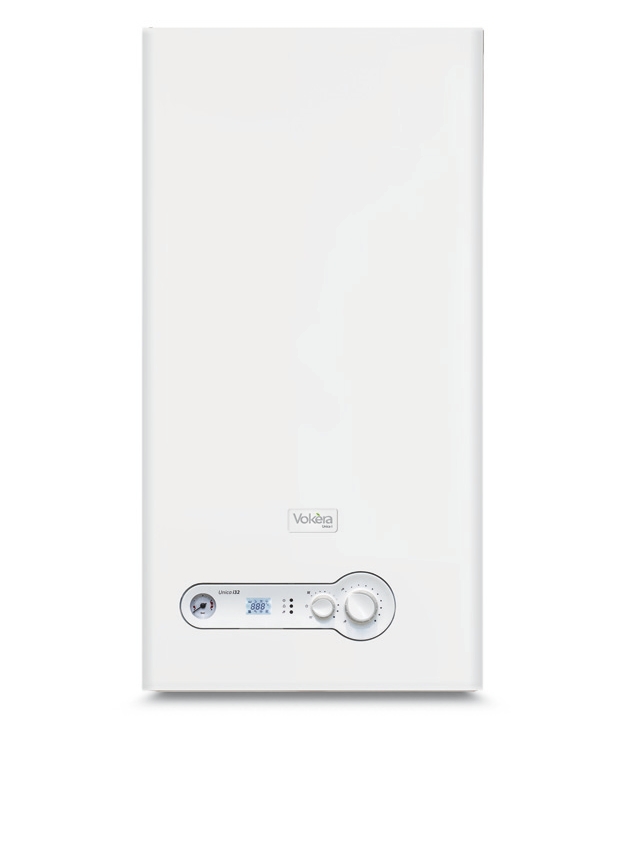
Vokera launches combi range ‘Unica i’ with impressive green credentials
Vokera has launched the Unica i range of combi boilers. The range has impressive green credentials for energy-conscious homeowners, and has been designed with ease of installation in mind.
Packed with features to maximise energy savings, the Unica i28, Unica i32 and Unica i36 have a modulation ratio of 10:1. This exceptionally high, class-leading modulation ratio improves energy efficiency by reducing the frequency of on/off cycling, while also minimising unnecessary wear and tear on boiler components and ensuring a stable DHW flow temperature. Furthermore, by having an extremely low minimum output e.g. i28 has a minimum output of 2.8kW, it becomes an extremely attractive solution for new-build properties, where the requirements for space-heating are much lower.
To further improve Unica i’s green credentials, the range incorporates intelligent energy saving software such as weather compensation and OpenTherm. This built-in functionality – when combined with a suitable Vokera control – enables further significant fuel efficiency saving up to £67 a year, whilst optimising end-user comfort. The Vokera OpenTherm control offers exceptional ease for the installer, with a simple plug and play connection, eliminating the need for a Part P qualified electrician to install.
In addition to its energy saving features, the Unica i has many other selling points for homeowners. A large DHW heat exchanger ensures the fast delivery of hot water, while the inclusion of a DHW flow meter (instead of a flow switch) allows for greater temperature stability to maximise end user comfort. The Unica i range also boasts an LCD backlit display to improve the boiler’s user interface panel, plus an outstanding five-year warranty for added peace of mind.
The new Unica i range of boilers is very installer-friendly too. Installation is made simple and straightforward with a rear flue option on all outputs and a newly designed fixing jig that can be removed once the pipework has been fabricated. This improves manoeuvrability once the boiler is placed on the wall, and is especially beneficial if wall surfaces are uneven.
The superior Riello heat exchanger is also front-facing, making maintenance much simpler.
Eleanor Fox, marketing director at Vokera, said: “With energy prices on the up, homeowners are looking at ways to reduce the amount of gas and electricity they use in the home. One way they can do this is to make sure that their heating and hot water system is as efficient as it can be. With this in mind, we have developed the Unica i range to fulfil the need for domestic combi boilers that feature lots of different ways to reduce energy usage, without compromising on performance.”
Having a NOx emission rating of below 40mg means that the Unica i surpass’ Nox Class 5 and enables maximum credit under the ‘Code for Sustainable Homes’. The Unica i features Vokera’s unique Autostop function as standard; this is of significant benefit for social housing and private landlords, Autostop will, once activated, notify a tenant that action is required a month before their annual gas safety check is due.
For further information click here for the Unica i web page and literature
Feb 17, 2012 | News & Events
Boilers with wide modulation ratios can improve efficiencies and comfort while reducing wear and tear on components – but what does the term mean, and how can installers explain it, and its benefits, to end users? Here Alister Maclachlan, product director at Vokèra, provides some advice following the launch of Vokèra’s Linea One boiler that boasts a modulation ratio of 10 : 1.
In recent years some boiler manufactures have started to talk about modulation ratios – but what does the term mean and, more importantly, how does the end user benefit?
In simple terms, the modulation ratio is a boiler’s ability to reduce its maximum output to its minimum output. A narrow modulation range gives a poor ratio whereas a wide range provides a good ratio. For example, if a boiler has a maximum output of 30kW and a minimum output of 7.7kW its modulation ratio is less than 4:1. Meanwhile, a boiler with a maximum output of 30kW and a minimum output of 3kW has a wider (hence better) modulation ratio of 10:1. As a general rule, for a boiler to be classed as having a ‘good’ modulation ratio its minimum output should be one fifth or one sixth of its maximum output.
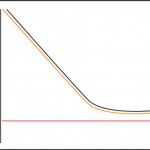
High Modulation Ratio Ignition Sequence
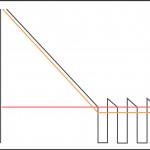
Low Modulation Ratio Ignition Sequence
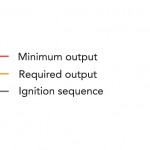
There are two important reasons why a good boiler modulation ratio is preferable – and understanding these reasons can help installers explain the benefits to end users.
Firstly, a good boiler modulation ratio reduces constant on/off cycling, improving efficiency and boiler longevity. For example, if a boiler has a high maximum output – let’s say 40kW – yet only has a modulation ratio of 4:1 it will only be able to modulate down to 10kW. However, when most rooms have reached the required temperature and radiator TRVs have closed, the demand on the boiler will be considerably less than 10kW. This means that the minimum output of the boiler will be higher than it needs to be, so the boiler will constantly switch on and off – leading to fuel inefficiency and unnecessary wear and tear on its components and parts.
A boiler with a high maximum output and a good modulation ratio, however, will be able to modulate down to an extremely low output, reducing wear and tear on primary components (fewer on/off cycles increase component longevity) and optimising fuel efficiency.
The second reason is uniquely associated with combi boilers, as it concerns the stability of domestic hot water (DHW). A boiler with a poor modulation ratio won’t be able to maintain a stable DHW flow temperature at a low flow rate, and might even cause the burner to switch off during operation. This can be a significant issue for end users who prefer showers over baths or for those who require a constant DHW outlet temperature – for example where there are young children or elderly people in a household, who are at a higher risk of scalding.
So when selecting a combi boiler it’s crucial to consider modulation ratios – and to remember that performance isn’t just about kW output. Nowadays 40kW combis are commonplace, having been introduced to improve hot water flow rates; in the 1980s a typical combi boiler had an output of 24kW (80,000BTUs) and a DHW flow rate of around 9.5l/pm at a 35oC differential, leading to end user gripes about hot water performance. However, installing a combi boiler with a high maximum output and a poor modulation ratio in a typical UK property is unlikely to deliver optimal efficiency, or comfort.
Let’s take a three-bedroom semi-detached house, built in the 1960s, as an example. This type of dwelling will probably only need a maximum of 15kW for space heating, and significantly less when it has reached temperature, especially if the property is insulated and has heating controls fitted. Hence a 40kW combi boiler that can only modulate down to 10kW isn’t good news for the customer either in the short or long term; as well as resulting in DHW instability and temperature fluctuations it will be unable to deliver fuel economy (the end user will of course be expecting their new boiler to deliver savings), and will probably suffer from early component failure.
Installers have a key role to play in ensuring that UK heating systems become more efficient, and end users will very often turn to them for advice. We believe that an increasing number of astute installers are beginning to recognise that if a boiler can boast a wide modulation ratio it will deliver significant benefits. It is however important to demonstrate this to customers, as it could help them in their decision making process. Manufacturers should be able to assist by providing diagrams and literature, which can help to explain the concept – and benefits – in a simple, easy-to-understand way.
Vokèra has made a significant investment in the development of boilers with excellent modulation ratios. Our Linea One 38kW combi boiler boasts a class-leading 10:1 modulation ratio, enabling it to modulate its output to 10 per cent of its maximum – 38kW down to 3.8kW.
Good modulation ratios offer a range of benefits – including increased fuel efficiency, end user comfort and boiler longevity.
For more information about the Vokèra Linea One boiler, click here
Nov 22, 2011 | News & Events
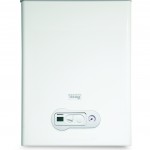
Vokera Verve
Vokera launches high power system boiler
Vokèra is pleased to announce its latest product launch, a new large domestic and light commercial system boiler Verve. The 47kW high-power boiler is designed to offer installers a solution for both large domestic and light commercial boiler applications.
Adding to Vokèra’s comprehensive range of boilers, the Verve offers a 90 per cent efficiency rating and can lead to reduced running costs of up to 35 per cent – making it one of the greenest high-power domestic boilers on the market.
Installers will find both the electronic regulation functions and heat engine design very familiar, being similar to those used on standard domestic boilers. The unit itself is also relatively lightweight weighing in at just 39 kilograms, meaning the Verve is easy to handle and easier to fit.
Alister Maclachlan, product director at Vokèra, comments: “We chose to launch the Verve as it offers installers the option to install a high power system boiler that is familiar in design to that of our domestic range, enabling them to expand their scope of work into larger domestic properties or small commercial premises.
The Verve boiler is supplied with an 80+80mm flue configuration enabling the flue to run up to 20m, or the flue can be re-configured with an optional flue adaptor to a 60/100mm or 80/125mm flue configuration. The Verve is supplied with isolating valves, enabling the boiler to be isolated from the system, which is extremely useful on larger systems, where to drain and refill the system could take several hours.
Vokèra also offer a range of options to accompany the Verve, including the highly recommended hydraulic separator, which ensures the appliance is isolated from any changes in the hydraulic flow rate. Also available is the three port valve which helps to speed up installation.
For more information on the Verve boiler click here
Sep 2, 2011 | News & Events
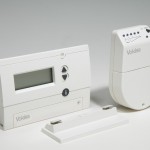 Increases in domestic gas prices mean we will all be feeling the pinch on household budgets more than ever this winter. Alister Maclachlan, product director at Vokèra, looks at how the latest advanced controls can significantly improve the efficiency of a heating system and reduce utility bills – without requiring too much of a financial outlay.
Increases in domestic gas prices mean we will all be feeling the pinch on household budgets more than ever this winter. Alister Maclachlan, product director at Vokèra, looks at how the latest advanced controls can significantly improve the efficiency of a heating system and reduce utility bills – without requiring too much of a financial outlay.
Following the announcement that energy prices are set to rise even further, many homeowners will be looking to reduce their energy usage to combat the price hikes. The Government’s RHI (Renewable Heat Incentive) and Green Deal schemes are designed to help homeowners afford energy saving measures – but aren’t going to provide immediate assistance.
Though the RHI Renewable Heat Premium Payments are now available, providing a one-off payment if a homeowner has a renewable technology installed (depending on the technology and if certain criteria is met), the ongoing tariffs will not be available until late 2012.
Similarly, the Green Deal will not be up and running until the end of 2012 at the earliest. This new scheme will see major energy suppliers offering loans to homeowners who want to install energy efficient measures and technologies.
So, with help from the RHI and Green Deal being some way off, how can installers help homeowners to find a cost-effective way to be more efficient? There is clearly a need for an immediate, affordable solution – and this is where the latest intelligent heating and hot water controls really come into their own.
Thermostats and controls have been on the market for many years and are an essential part of a modern central heating system; however, more recently manufacturers have invested heavily in further advancing boiler control technology to improve the efficiency of the boiler. In fact, the latest generation of controls offer homeowners even greater command over their heating and fuel usage, and when teamed with a high efficiency boiler, can dramatically reduce fuel bills for the end user.
The very latest innovation to hit the market is built-in OpenTherm technology. It’s estimated that up to 10 per cent of the energy consumed for space heating can be saved by using this type of control with an appropriate HE boiler. Fuel efficiency can be maximised by specifying these controls alongside boilers with higher modulation ratios, for example ratios of 5:1 and higher. For customers looking to reduce their fuel consumption immediately, OpenTherm could be an ideal solution, and is suitable for retrofit as well as new installations (depending on the boilers compatibility with OpenTherm protocol).
The benefit of OpenTherm technology lies in its ability to regulate the temperature of the room more effectively than a standard room thermostat. When a standard ON/OFF room temperature/programmable room thermostat is used, the boiler will usually provide a flow temperature that’s much higher than required for the room to reach the temperature set by the thermostat. This causes the boiler to ‘overshoot’, and as a result the home will actually become too hot. To compensate, the boiler switches off, and the temperature drops again. When the temperature goes below the set-point (the nature of traditional thermostatic controls means a boiler will ‘undershoot’), the boiler turns back on – and so this pattern continues. This frequent ON/OFF cycling results in an inefficient use of fuel and unnecessary wear and tear on boiler parts.
OpenTherm protocol controls are also available as wireless (RF) units, making them particularly suitable for retrofit applications. Vokèra is one of the few manufacturers to offer this type of control in a wireless format. Wireless OpenTherm controls provide a neat installation, something that is particularly ideal for house-proud customers who are concerned about the aesthetics of their home, and are easy to fit. With a 30 metre wireless transmitter, both new and retrofit installations are quick, simple and tidy.
Another recent development in controls has been weather compensation technology, which regulates the output of the boiler in line with the outside temperature, and is particularly effective when unseasonal weather occurs. Using weather compensation will almost always ensure that the boiler is fully condensing and this maximises fuel efficiency. In fact, under the proposed SAP 2009, the installation of a weather compensation control can increase the efficiency of a condensing boiler by up to 3%, enabling efficiencies in excess of 93 per cent. A weather compensation control not only saves energy, it can also ensure a more comfortable environment inside the home too.
While a selection of boilers are being supplied with weather compensation controls included, a key benefit is that existing boilers can be upgraded to include this technology. If fitting an external weather sensor, it is advisable to fit the controls to a north or north-west facing wall to achieve optimum results.
Both OpenTherm and weather compensation controls offer an affordable, cost-effective way to improve energy efficiency – and could provide a useful stop-gap until other measures, such as a more efficient boiler or a renewable technology, can be fitted.
When specifying controls it’s worthwhile looking for any additional features that will add to the usability of the control, ensuring the homeowner can make the most of their heating system, manage their energy efficiently and maximise comfort. For example, the OpenTherm protocol RF control from Vokèra includes a handy holiday function. This allows the end-user to set the control for the duration of the holiday, and the temperature at which the boiler should operate at during this period and for when they return.
If a control boasts an optimisation function, this means it will start the boiler working before the programmed ‘ON’ time, so the desired temperature is reached for when the homeowner wants it. Some controls also give homeowners access to useful information too, such as the current and target room temperatures.
When specifying controls with advanced user functions, it is important to ensure the homeowner is properly briefed when the unit is installed. This will ensure the customer knows how to operate the controls and that the maximum energy savings can be achieved.
With fuel prices rising dramatically and the effects of the economic downturn still being felt, there has never been a more important time to ensure a home’s central heating system runs as effectively and efficiently as possible. Installers can provide valuable information to homeowners about the advantages of intelligent controls to help them reduce their energy usage now, so they are better prepared to manage the cost of their utility bills in the future.
Our website has a wealth of information on boilers, controls and renewables, to help you save on your fuel bills
 Vokèra, a leading heating manufacturer, has been highly commended by Domestic and General (D&G) customers for the second year running. D&G, the UK’s leading warranty specialist, generates a quarterly report based on a survey questionnaire sent to its customers following each callout regarding customer service and satisfaction. For the fifth quarter running Vokèra has received outstanding results. The latest report has put Vokèra in second place in comparison not only with rival boiler brands but crucially leading white goods manufacturers, with an overall satisfaction rating of 97.4%.
Vokèra, a leading heating manufacturer, has been highly commended by Domestic and General (D&G) customers for the second year running. D&G, the UK’s leading warranty specialist, generates a quarterly report based on a survey questionnaire sent to its customers following each callout regarding customer service and satisfaction. For the fifth quarter running Vokèra has received outstanding results. The latest report has put Vokèra in second place in comparison not only with rival boiler brands but crucially leading white goods manufacturers, with an overall satisfaction rating of 97.4%.








